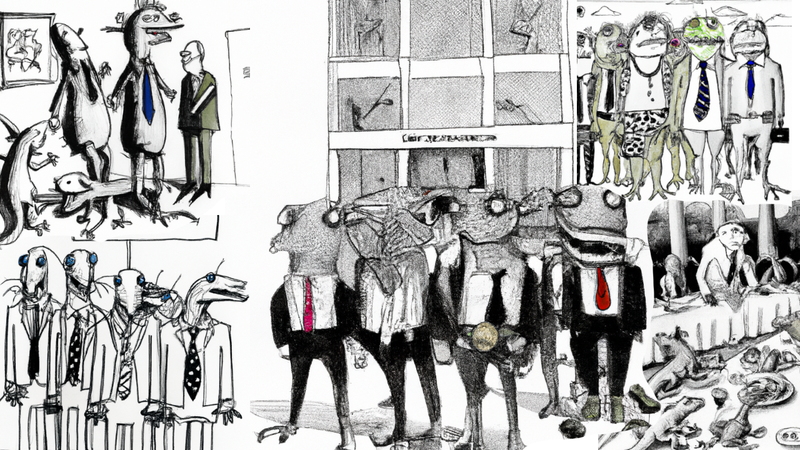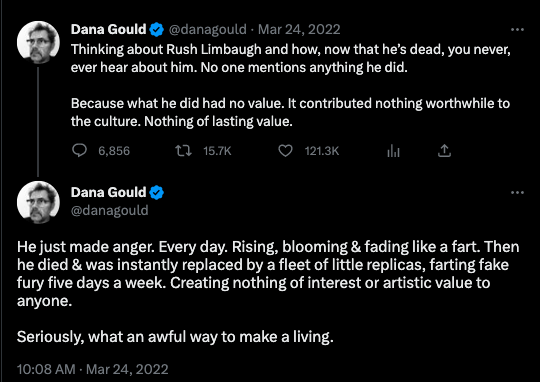Why things tend to suck and what we're doing about it.

Collage of images generated by DALL-E with the prompt “An ink drawing in the style of Ralph Steadman of a group of creatures with human bodies dressed in business attire but with lizard heads, outside Twitter corporate headquarters.” DALL-E
I stopped using social media about 10 years ago, and am only back on it now as a consequence of California Local. Much of our social-media output is programmatic: We have a Twitter bot for each county in our service area which tweets out CHP incidents, upcoming government meetings, links to recent articles published by us and our local news allies, and other information of local interest. In addition to the news and telemetry tweets from the bots, I stay signed in to the Santa Cruz and Monterey Twitter accounts to retweet and provide some human curation.
Twitter is—or was—great as a newsfeed, and over time our Twitter accounts steadily accumulated followers as people discovered them and found them useful.
Unfortunately, it’s become clear to me that Twitter, famously under new management, is becoming less useful to us and less aligned with our values. So we’ve established a Mastodon instance to try that emerging social network out.
I’ve been hanging out in the Fediverse for the last few months getting a feel for the place, and in the process have, as the colonialists used to say, “gone native.”
Or rather, as with Harrison Bergeron, the shackles and gamification fell away in the Fediverse, and I can now see what a social network looks like when monetization is not the driving factor. Hence, no ads, no algorithm, no attention traps, no need for profit, no need to please shareholders or investors.
In the Fediverse, the corrosive effect of monetization has a name: “enshittification.” The term was coined and defined by Cory Doctorow in his blog post ‘TikTok’s Enshittification.”
“Here is how platforms die: first, they are good to their users; then they abuse their users to make things better for their business customers; finally, they abuse those business customers to claw back all the value for themselves. Then, they die.”
Riffing on that, Mike Masnick of TechDirt explored How the Friedman Doctrine Leads to the Enshittification of All Things:
“Because once you’ve gone public, even if you have executives who still want to focus on pleasing users and customers, eventually any public company is also going to have other executives, often with Wall Street experience, who talk about the importance of keeping Wall Street happy. They’ll often quote Milton Friedman’s dumbest idea: that the only fiduciary duty company executives have is to increase their profits for shareholders.”
This is what happened to mass media and news. Television news used to be a loss leader for local television stations, who only broadcast it because the FCC mandated that a certain amount of airtime had to be devoted to news and educational programming.
That changed in 1980 when CNN went live 7/24/365 with an aim of making a boodle. Now forty-some-odd years later every storm and full moon has a marketing brand-name, and every bus crash in India or heavy rain in Spain or tree falling onto a garage is instantly reported to the world because let’s face it, sowing anxiety is good business —what if it happens here?!—and by the time the Swedish Bikini Team lands, you’re ready for a beer.
The lucrative stress induced by the 24-hour news cycle only increased with the advent of the Internet. During the term of the last president, "doom scrolling" entered the lexicon as Americans woke up every day, propped themselves up in bed and swiped through the news wondering what craziness had transpired while they were asleep.
That’s the news side of the operation, where even if breathlessly reported, they still more or less deal with facts and are constrained to describing things that actually happened.
In the corner where the opinion desk used to sit, though, the game theory of monetization has inexorably led from sowing anxiety to farming rage.

I think Masnick is on to something. The so-called Friedman doctrine is at the root-nut of enshittification. Declaring that media corporations are responsible only to shareholders denies any obligation to other stakeholders. These include the users, the vendors, the communities in which the business entity operates, and of course, future generations.
This enshittified mentality is on full display in Twitter’s transformation under the new ownership, in an extreme form. Fire people with no logic or plan. Get rid of the janitors and make the remaining employees bring their own toilet paper. Stop paying rent for the building you make everyone work and sleep in, screw third-party developers with no notice, and so on.
To a lesser extreme, but still deeply shitty, are massively profitable corporations currently laying off thousands of people at a time. “I take full responsibility for the decisions which led us here.” declared Alphabet’s Sundar Pichai as he layed off 12,000 staff.
As Google’s parent company, Alphabet is grotesquely profitable, and even if it took a year or two, the company could have afforded to redeploy the 12,000 to do better things. Alphabet could have offered incremental buy-outs or let natural attrition reduce headcount over time. There are myriad ways the company whose motto was “Don’t be evil” could have truly demonstrated taking “responsibility for the decisions,” at the cost of a slight reduction of profit.
Which leads to the question: Why hurry to massively disrupt 12,000 people’s lives, especially the folks here on H-1B visas?
Answer: enshittification!
And so we see the labor movement gathering and gaining strength as the pathology of our form of capitalism leads to ever greater enshittifcation of the workplace.
And children organizing and coming together to prevent the enshittification of the climate.
And here on the Internet, as a counter to the enshittifiction of digital platforms, the Fediverse.
The genius of democracy is that it’s a way for humans to self-organize around shared values. The creation of the Fediverse and the migration of people away from enshittified platforms demonstrate what humans can achieve when working together out of enlightened self interest to create the best outcome for the most people.
It’s what happens when people discover each other, connect, and act.
It’s what happens when people citizen.
At California Local, that idea guides our efforts, and our products are designed to make it easier to citizen.
Seriously, what an awesome way to make a living.
(You can help us stay unenshittified by donating today!)